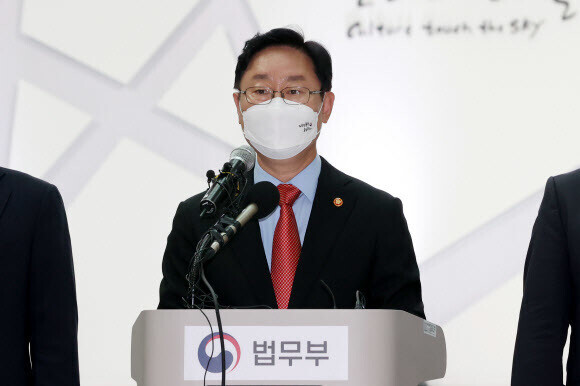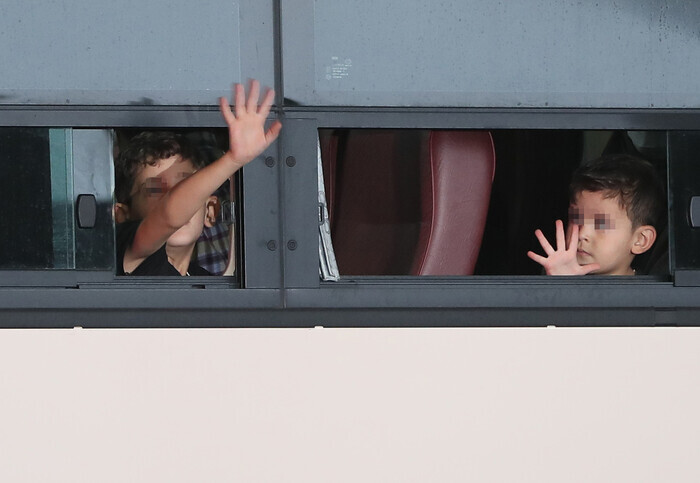hankyoreh
Links to other country sites 다른 나라 사이트 링크
Afghans who worked for S. Korean government will be allowed to stay long term, justice minister says

South Korean Minister of Justice Park Beom-kye announced plans Thursday to “confirm domestic sojourn status on a phased basis” for Afghan nationals who recently arrived at Incheon International Airport, including those who previously assisted South Korean efforts in Afghanistan and their family members.
The Ministry of Justice (MOJ) began work on amending the enforcement decree for the Immigration Act, with plans to issue short-term visas that would allow the Afghan nationals to remain in South Korea for 90 days, after which long-term sojourn visas would be granted on the basis of “special merit” once a future amendment is passed.
Speaking at Incheon International Airport’s Millennium Hall on Thursday afternoon, Park shared the planned approach for the sojourn status for the arriving Afghans.
“We are considering issuing short-term visit [C-3] arrival visas at the airport to allow [the Afghans] into the country, after which their status would be changed to long-term sojourn eligibility [F-1], which would allow them to remain here on a stable basis,” he said.
“Finally, once the temporary sojourn stage is over, we would be granting them free employment eligibility [F-2] status, which would allow them to live self-sufficiently,” he added.
To achieve this, the MOJ gave advance legislation notice that morning for a partial amendment of the Immigration Act’s enforcement decree. The key change would be a new provision granting long-term sojourn F-2 visas to foreign nationals who have contributed “special merit” to the Republic of Korea.
In the decree’s text specifying the conditions for employment and long-term sojourn eligibility for foreign nationals, the MOJ added a new provision for “those recognized by the Minister of Justice as being persons of special merit to the Republic of Korea or as having contributed to promotion of the public interest.”
Long-term sojourn visas are typically sought by foreign nationals remaining in South Korea for long periods of time as a step toward achieving permanent residence eligibility. Those who receive them can remain in South Korea and work freely for up to five years.
The enforcement decree amendment had been planned since before the Afghanistan situation as a measure to reflect South Korea’s stature, and the situation with the Afghan nationals’ arrival merely sped the process along, the MOJ explained.
“Under the current law, there is no visa type that corresponds to the term ‘persons of special merit,’” an MOJ official said.
“Once the amendment passes, not only the arriving Afghans but other foreign nationals who have made contributions to South Korea will receive eligibility for long-term sojourns,” the official added.

In his remarks Thursday, Park also said that South Korean society should welcome the arriving Afghan nationals.
“These people have all worked with us at our embassy and bases, cooperating on the government’s reconstruction efforts in Afghanistan,” he said.
“While they may have been living in a faraway nation geographically, they have really been like neighbors to us,” he added.
He also noted, “There was a time when we too had to take refuge because of war, and we received the help of the international community. Now it is our turn to help.”
He went on to “ask for the public’s profound understanding and support in showing that the Republic of Korea is inclusive and abundantly loyal and that we do not forsake those who have helped us.”
Many of the Afghans arriving that day were physicians, vocational training instructors, and embassy administrative staff. Over half of the arriving passengers were reportedly minors.
By Jeon Gwang-joon, staff reporter
Please direct comments or questions to [english@hani.co.kr]

Editorial・opinion
![[Guest essay] Preventing Korean Peninsula from becoming front line of new cold war [Guest essay] Preventing Korean Peninsula from becoming front line of new cold war](https://flexible.img.hani.co.kr/flexible/normal/500/300/imgdb/original/2024/0507/7217150679227807.jpg) [Guest essay] Preventing Korean Peninsula from becoming front line of new cold war
[Guest essay] Preventing Korean Peninsula from becoming front line of new cold war![[Column] The state is back — but is it in business? [Column] The state is back — but is it in business?](https://flexible.img.hani.co.kr/flexible/normal/500/300/imgdb/original/2024/0506/8217149564092725.jpg) [Column] The state is back — but is it in business?
[Column] The state is back — but is it in business?- [Column] Life on our Trisolaris
- [Editorial] Penalties for airing allegations against Korea’s first lady endanger free press
- [Editorial] Yoon must halt procurement of SM-3 interceptor missiles
- [Guest essay] Maybe Korea’s rapid population decline is an opportunity, not a crisis
- [Column] Can Yoon steer diplomacy with Russia, China back on track?
- [Column] Season 2 of special prosecutor probe may be coming to Korea soon
- [Column] Park Geun-hye déjà vu in Yoon Suk-yeol
- [Editorial] New weight of N. Korea’s nuclear threats makes dialogue all the more urgent
Most viewed articles
- 1Yoon’s broken-compass diplomacy is steering Korea into serving US, Japanese interests
- 2[Guest essay] Preventing Korean Peninsula from becoming front line of new cold war
- 3[Column] Why Korea’s hard right is fated to lose
- 460% of young Koreans see no need to have kids after marriage
- 5[Guest essay] Maybe Korea’s rapid population decline is an opportunity, not a crisis
- 6S. Korean first lady likely to face questioning by prosecutors over Dior handbag scandal
- 7[Reporter’s notebook] In Min’s world, she’s the artist — and NewJeans is her art
- 8After 2 years in office, Yoon’s promises of fairness, common sense ring hollow
- 9Amid US-China clash, Korea must remember its failures in the 19th century, advises scholar
- 10[Column] The state is back — but is it in business?